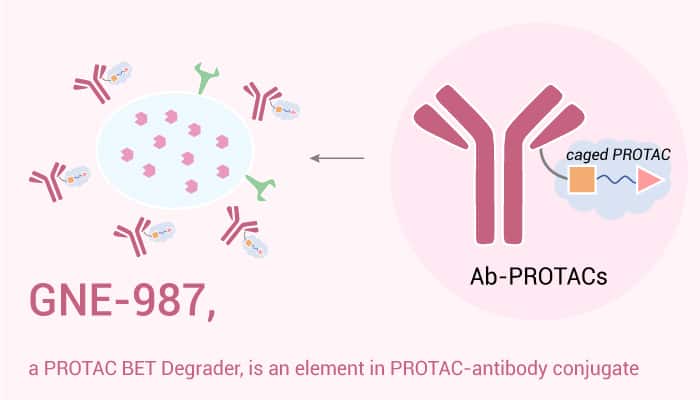BRD4 is a member of the BET family of proteins (BRD2, 3, 4, and T). It functions as an epigenetic “reader” of acetylated histone lysine residues via its two bromodomain motifs (BD1 and BD2). Disruption of BRD4-histone interactions is an attractive strategy for the development of novel anti-cancer agents. Recently, chimeric molecules form ternary complexes between BRD4 and components of various E3 ubiquitin ligase complexes (e.g., VHL, CRBN, XIAP), MDM2. They induce potent degradation of BRD4 and other BET family proteins via ubiquitination and subsequent destruction in the cellular proteasome. These chimeric degraders offer possible therapeutic advantages relative to simple BET inhibitors. These molecules contain portions of the well-known BET inhibitor JQ1, and each binds to VHL as a means to induce ubiquitination of the targeted BRD4 protein. In this study, GNE-987, a highly active chimeric BET degrader, exhibits picomolar cell BRD4 degradation activity.

GNE-987, a potent chimeric BET degrader, exhibits picomolar cell BRD4 degradation activity (DC50=0.03 nM for EOL-1 AML cell line). Moreover, GNE-987 binds equipotently to the BD1 and BD2 bromodomains of BRD4 with low nanomolar affinities (IC50=4.7 and 4.4 nM, respectively). Furthermore, it incorporates a potent BET binder/inhibitor, a VHL-binding fragment, and a ten methylene spacer moiety. In addition, GNE-987 can be used in PROTAC-Antibody Conjugate (PAC).
GNE-987 inhibits EOL-1 and HL-60 cell viability with IC50s of 0.02 and 0.03 nM, respectively, and inhibits MYC expression with an IC50 of 0.03 nM. It also degrades the BRD2 and BRD3 BET family proteins. In addition, this study shows the first degrader-antibody conjugate by attaching GNE-987 to an anti-CLL1 antibody via a novel linker.
In summary, GNE-987, a potent BET degrader, degrades the BRD2 and BRD3 BET family proteins.
Reference:
Pillow TH, et al. ChemMedChem. 2019 Oct 31.